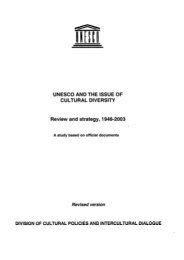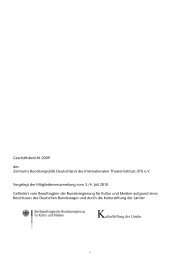Kultur in Gefahr - ITI
Kultur in Gefahr - ITI
Kultur in Gefahr - ITI
You also want an ePaper? Increase the reach of your titles
YUMPU automatically turns print PDFs into web optimized ePapers that Google loves.
62 Artistic Expression <strong>in</strong> a Corporate World<br />
Artistic Expression <strong>in</strong> a Corporate World 63<br />
latter also show other films of lower commercial value from the same<br />
distributor. The blockbuster is <strong>in</strong> this way licensed as part of a package<br />
deal to saturate the screens. In many jurisdictions, this practice violates<br />
competition rules. Arguably, the audience’s demand is therefore largely<br />
irrelevant s<strong>in</strong>ce the market relationship takes place between the majors as<br />
producers and distributors (offer) and film exhibitors (demand). The<br />
dom<strong>in</strong>ant market position of the majors’ oligopoly leaves almost no screen<br />
capacity for content other than for blockbusters from one s<strong>in</strong>gle cultural<br />
orig<strong>in</strong>, unless governments <strong>in</strong>tervene on a national and regional level by<br />
way of cultural laws and policies aimed at promot<strong>in</strong>g diversity <strong>in</strong> the<br />
audiovisual offer.’ (Germann 2003)<br />
It would make sense to tax the excessive market<strong>in</strong>g budgets of<br />
blockbusters, bestsellers and stars and transfer this collected money to<br />
the market<strong>in</strong>g budgets of other cultural productions. This would br<strong>in</strong>g<br />
them to an equal position and would make sure that falsification of the<br />
competition no longer exists. (Ibid.)<br />
(i) Oligopolistic ownership claims may be limited as well by the<br />
reduction of our excessive copyright system. This has an octopus-like<br />
character. It will last almost forever, and everyth<strong>in</strong>g that looks like a<br />
specific content may also be owned. Copyright has become less of an<br />
<strong>in</strong>strument to pay artists but turned more <strong>in</strong>to a control mechanism of the<br />
cultural <strong>in</strong>dustries with as much content as possible. The time is near<br />
when our entire cultural heritage from the past to the present will be <strong>in</strong> the<br />
hands of only a few owners. It goes without say<strong>in</strong>g that this is not<br />
democratic. Such a monopolistic control on artistic expressions has never<br />
existed before <strong>in</strong> history and <strong>in</strong> no other culture other than <strong>in</strong> present<br />
Western societies.<br />
Lower copyright protection standards are likely to reduce excessive<br />
<strong>in</strong>vestments <strong>in</strong> stars, blockbusters and bestsellers. This has a<br />
consequence that cultural <strong>in</strong>dustries will no longer produce “contents”<br />
that are meant for and able to dom<strong>in</strong>ate cultural markets all over the planet.<br />
At the same time, this may result <strong>in</strong> the possibility of many, many more<br />
artists and their creations f<strong>in</strong>d<strong>in</strong>g audiences, not be<strong>in</strong>g h<strong>in</strong>dered by the<br />
dom<strong>in</strong>ant market forces. (Smiers 2003: 207-216).<br />
This is exactly the purpose of all ownership regulations discussed thus<br />
far. A second category of regulations concerns the cultural “content”.<br />
Content regulations<br />
Hav<strong>in</strong>g a great number of decision makers concern<strong>in</strong>g artistic expression<br />
does not automatically guarantee that audiences, buyers, and listeners can<br />
benefit from the rich diversity of artistic creations and performances that<br />
artists produce. The offer might tend towards a limited range of products.<br />
Why? For <strong>in</strong>stance, because they are cheap, or it is sure that they will<br />
attract a mass public, or they are uncontroversial, or they are more <strong>in</strong> l<strong>in</strong>e<br />
with the political or aesthetic convictions of owners and programme<br />
makers.<br />
An even more important reason to have content regulations is the<br />
reality that we might not succeed immediately <strong>in</strong> restra<strong>in</strong><strong>in</strong>g the size and<br />
power of cultural conglomerates and turn<strong>in</strong>g them <strong>in</strong>to small or medium<br />
sized enterprises, as mentioned above. A third reason to have content<br />
regulations is that nobody <strong>in</strong> any society has an equal voice and the<br />
possibility to be heard <strong>in</strong> public; this also applies to the cultural field. The<br />
consequence of this is that many artistic expressions do not count <strong>in</strong><br />
public debate and experience, for <strong>in</strong>stance about taste, about language,<br />
design, k<strong>in</strong>ds of music, theatrical imag<strong>in</strong>ations, narrative structures <strong>in</strong> film,<br />
or on television. This would be a democratic loss. It will be an<br />
impoverishment if cultural products come from only one foreign country<br />
(with a little from the own country), and not from many other sources,<br />
countries, and cultures.<br />
In general, content regulations are meant to provide access to a<br />
wide range of diverse content via appropriate and relevant distribution<br />
channels. This immediately calls to m<strong>in</strong>d what has already been discussed:<br />
many countries do not have the capacity to let artists create, for example<br />
audiovisual works that are of such quality that they can compete with<br />
foreign products com<strong>in</strong>g from huge cultural <strong>in</strong>dustries. This said, these<br />
countries should get the f<strong>in</strong>ancial means to build production and<br />
distribution <strong>in</strong>frastructures while giv<strong>in</strong>g artists the chance to develop their<br />
craft.<br />
Content regulations can make sure that cultural <strong>in</strong>dustries cannot<br />
go on to dump their wares on markets that do not have the economic and<br />
<strong>in</strong>frastructural clout to resist these cultural <strong>in</strong>vasions, and that would<br />
otherwise never be able to produce artistic expression which is more<br />
costly. Many countries are small. So, it would be wise, for such countries<br />
to cooperate on a regional level with neighbour<strong>in</strong>g countries <strong>in</strong> the










![Geschäftsbericht 2010 [pdf 2 MB] - ITI](https://img.yumpu.com/4380475/1/184x260/geschaftsbericht-2010-pdf-2-mb-iti.jpg?quality=85)